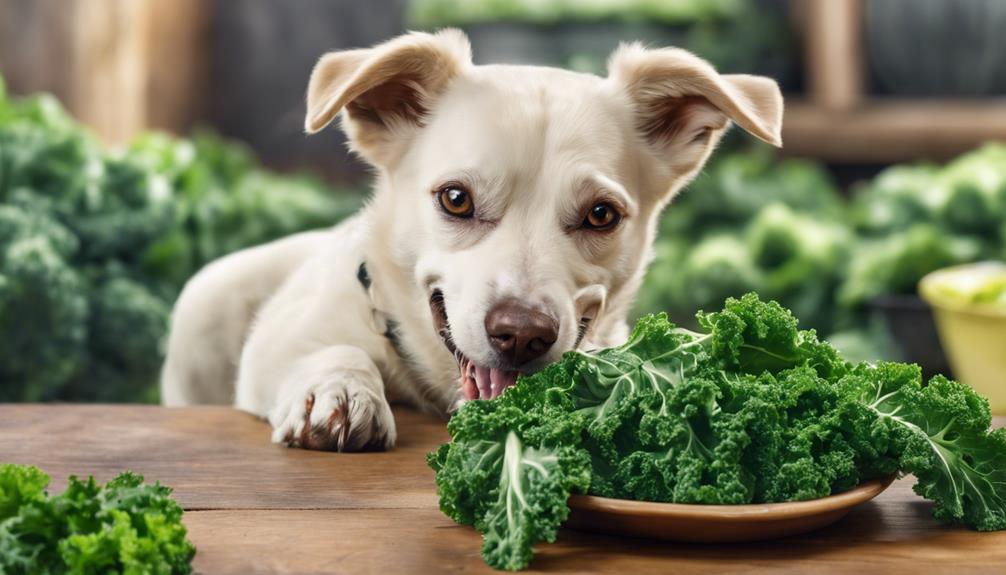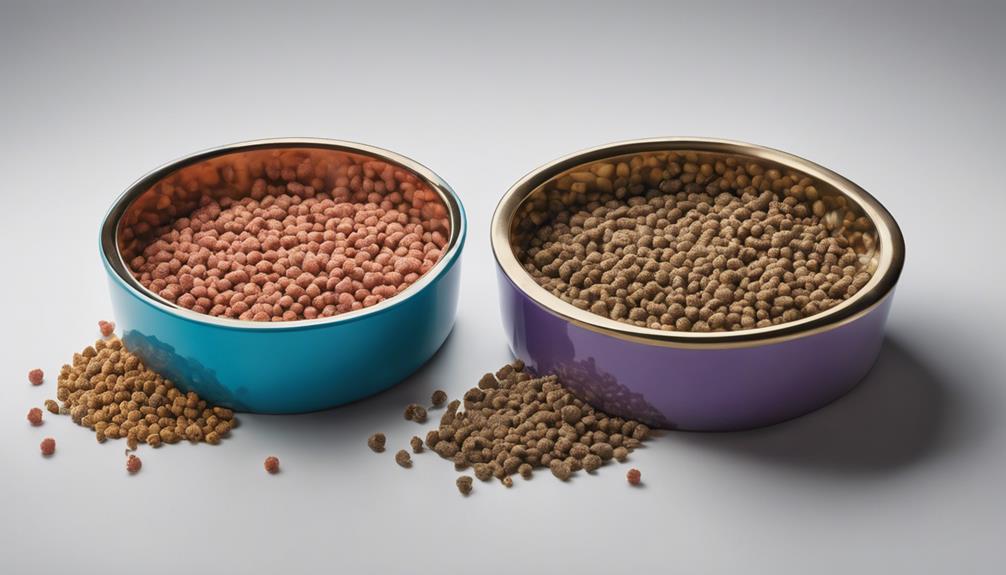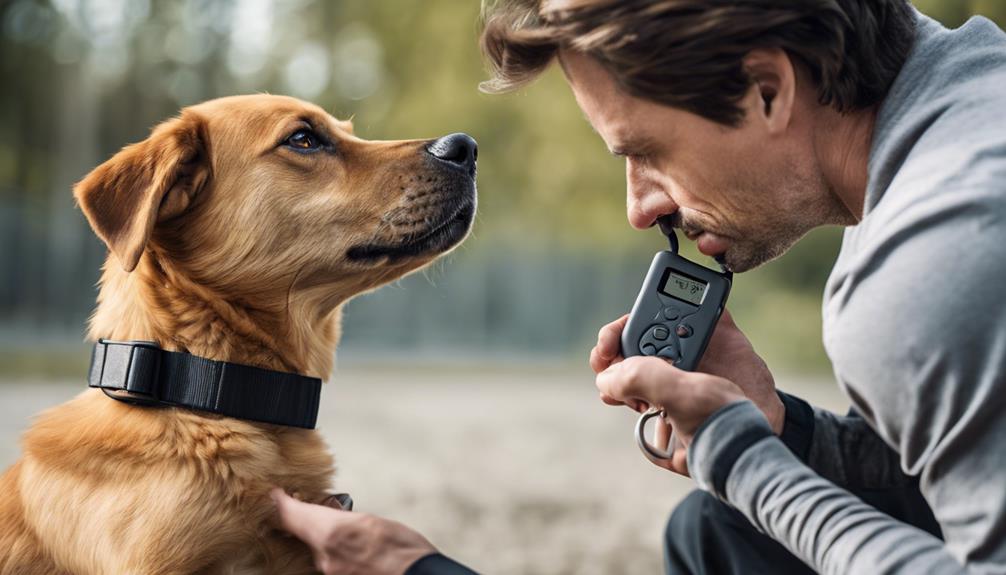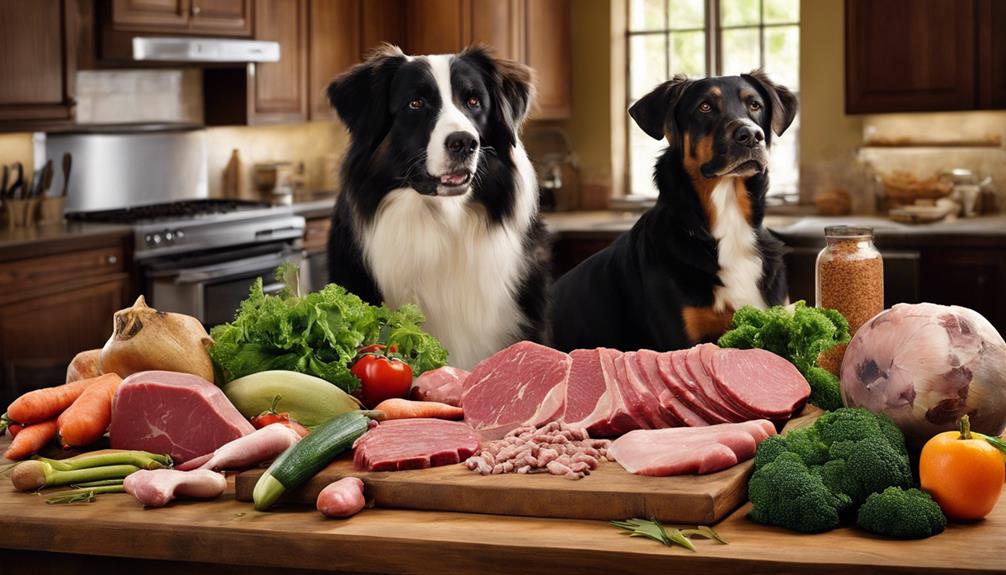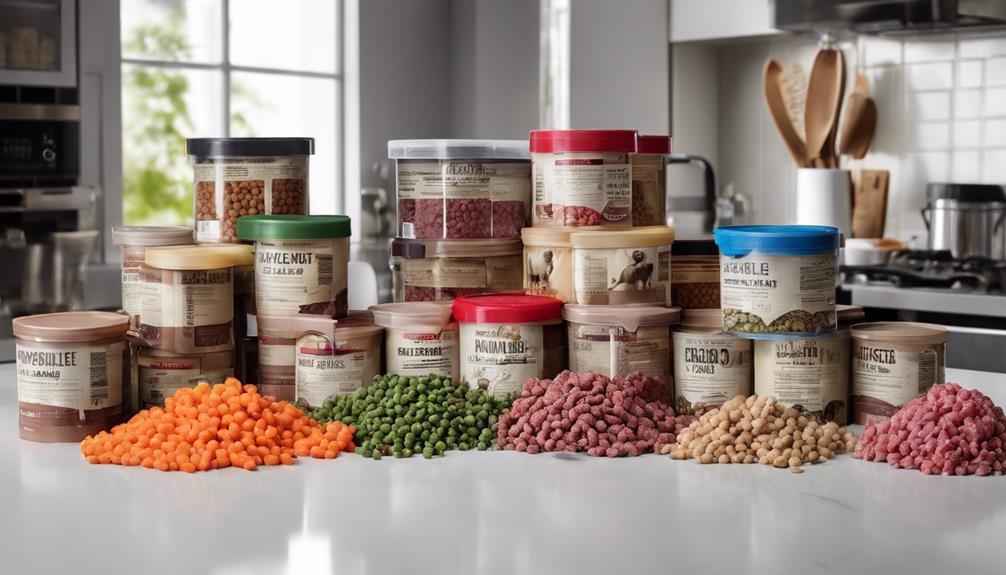Feeding kale to dogs can provide vitamins like A, K, C, and minerals such as calcium and potassium. However, be cautious as kale contains calcium oxalate, leading to kidney stones. It may cause gastric irritation and digestive troubles due to isothiocyanates. Too much kale fiber can result in stomach issues. Control portion sizes, introduce kale gradually, and consult a vet for proper guidance. Keep a close eye on dogs with sensitive stomachs. Before adding kale to your dog's diet, check with your vet, especially if your dog has health issues. Your dog's well-being is top priority.
Key Takeaways
- Kale is nutrient-rich, providing essential vitamins and minerals beneficial for dogs.
- Overfeeding kale can lead to health risks such as kidney stones and digestive issues.
- Moderation is key to prevent adverse effects; consult a vet for appropriate portions.
- Dogs with thyroid problems should avoid kale due to its impact on thyroid function.
- Introduce kale gradually, monitor for tolerance, and watch for any digestive discomfort.
Nutrient Content of Kale
Kale boasts an impressive array of essential nutrients important for a dog's overall health and well-being. This leafy green vegetable is packed with vitamins A, K, C, and B6, which are important for maintaining a dog's immune system, vision, skin, and coat health.
Additionally, kale contains various minerals like manganese, calcium, copper, potassium, magnesium, iron, and phosphorus, essential for supporting bone strength, muscle function, and overall well-being in dogs.
The fiber content in kale aids in digestion and promotes gut health, ensuring that your furry friend's tummy stays happy and healthy. Moreover, being low in calories but high in antioxidants, kale serves as a nutritious addition to your dog's diet, providing a range of health benefits.
The beta-carotene found in kale specifically supports eye health and helps protect your dog's retina, ensuring their vision remains sharp and clear. Overall, kale isn't only safe for dogs but also offers a plethora of essential nutrients that contribute to their overall vitality and longevity.
Risk of Calcium Oxalate
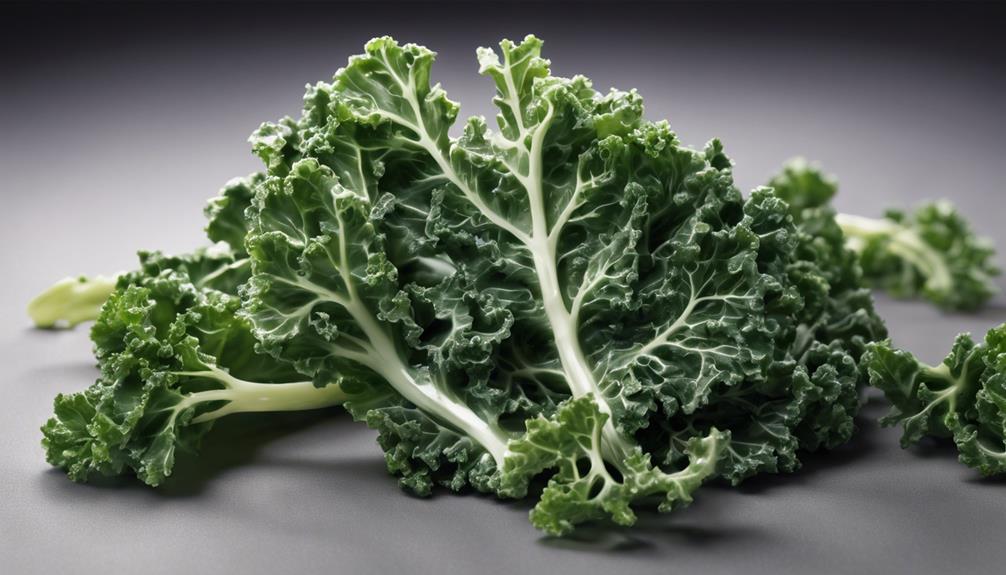
When considering the inclusion of kale in a dog's diet, it's important to be aware of the potential risk posed by its high levels of calcium oxalate. Calcium oxalate, found in kale, can contribute to the formation of kidney and bladder stones in dogs. These crystals have the potential to irritate the urinary tract, leading to health issues.
Dogs with a history of kidney or bladder stones should avoid consuming kale due to its calcium oxalate content, which can exacerbate their condition. Excessive consumption of kale can increase the risk of developing calcium oxalate-related problems in dogs. To prevent these complications, it's essential to monitor kale intake and consult a veterinarian for guidance.
Potential Gastric Irritation
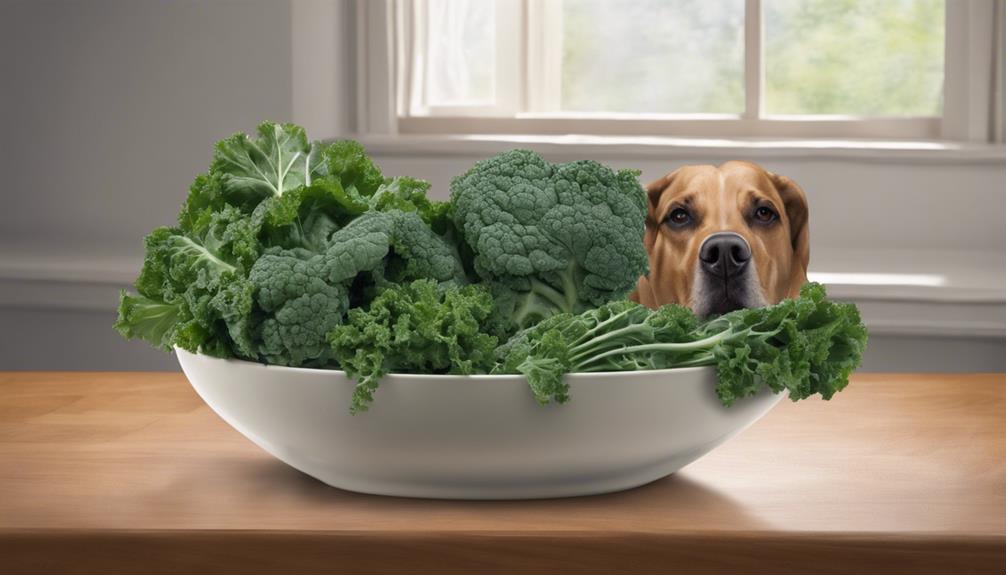
Have you ever wondered how the isothiocyanates in kale can potentially cause gastric irritation in dogs?
When dogs consume even a small amount of kale, these compounds can lead to severe gastric irritation, resulting in adverse reactions that may impact their pet health.
Excess consumption of kale can also cause stomach upset and diarrhea in some dogs, especially those with sensitive stomachs.
To safeguard against such issues, it's advisable to introduce kale gradually into your dog's diet and monitor their tolerance levels closely.
Cooking kale before feeding it to your dog can help reduce the risk of gastric irritation, making it easier for your furry friend to digest.
Digestive Concerns With Kale
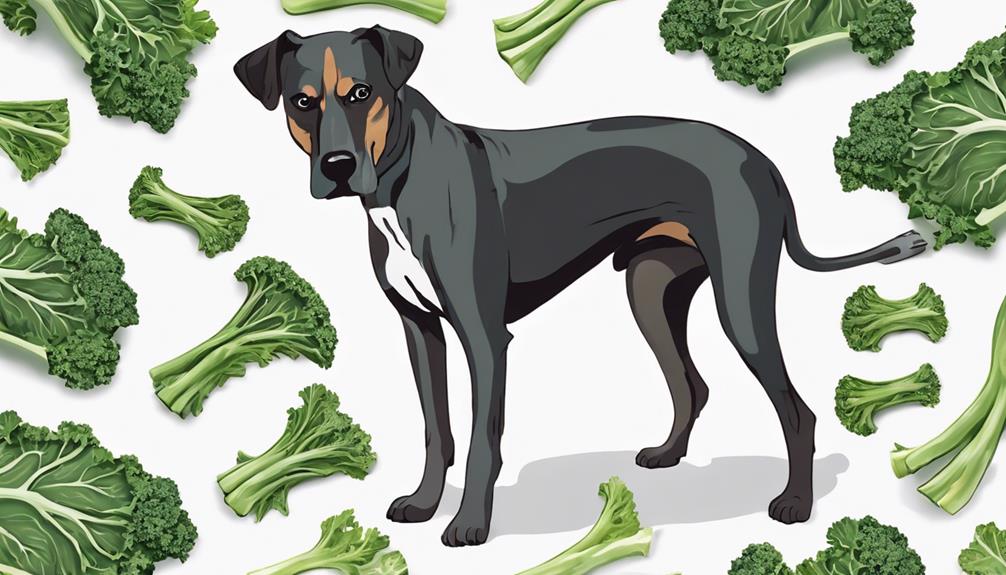
Kale can lead to digestive issues in dogs due to its high fiber content, potentially causing gas, bloating, or diarrhea.
Excessive kale consumption may upset the stomach, especially in dogs with sensitive stomachs or existing digestive problems.
It's important to introduce kale slowly into your dog's diet, monitor their response, and adjust the amount to prevent digestive concerns.
Kale and Gas
Consuming large amounts of raw kale can lead to increased gas production and digestive discomfort in dogs, particularly those with sensitive stomachs. The high fiber content in kale can cause bloating and flatulence, which may result in discomfort for your furry friend.
To help reduce these issues, consider feeding kale to your dog in small quantities and try cooking it first. Cooking kale can break down some of the fibers that contribute to gas production. It's essential to monitor your dog's response to kale and adjust the portion size accordingly.
Kale and Diarrhea
How can the high fiber content in kale affect a dog's digestive system, specifically in relation to diarrhea?
Dogs may experience diarrhea when consuming kale due to its high fiber content, which can be challenging for some to digest.
To provide insight into this issue, consider the following emotional bullet points:
- Watching your furry friend struggle with digestive issues can be distressing.
- Seeing your dog experience discomfort from diarrhea after eating kale is concerning.
- Knowing when to seek help from a veterinarian for your dog's digestive health is essential.
- Understanding the importance of introducing kale gradually to prevent diarrhea can help your dog adjust better.
Kale and Vomiting
Experiencing vomiting in dogs can be a concerning issue linked to the high fiber content found in kale. The fiber in kale may be hard for some dogs to digest, leading to potential vomiting episodes.
Monitoring your furry friend for signs of vomiting after consuming kale is essential for their digestive health. If your dog does vomit after eating kale, it might be wise to reduce the amount or frequency of kale in their diet.
Moderation in Feeding
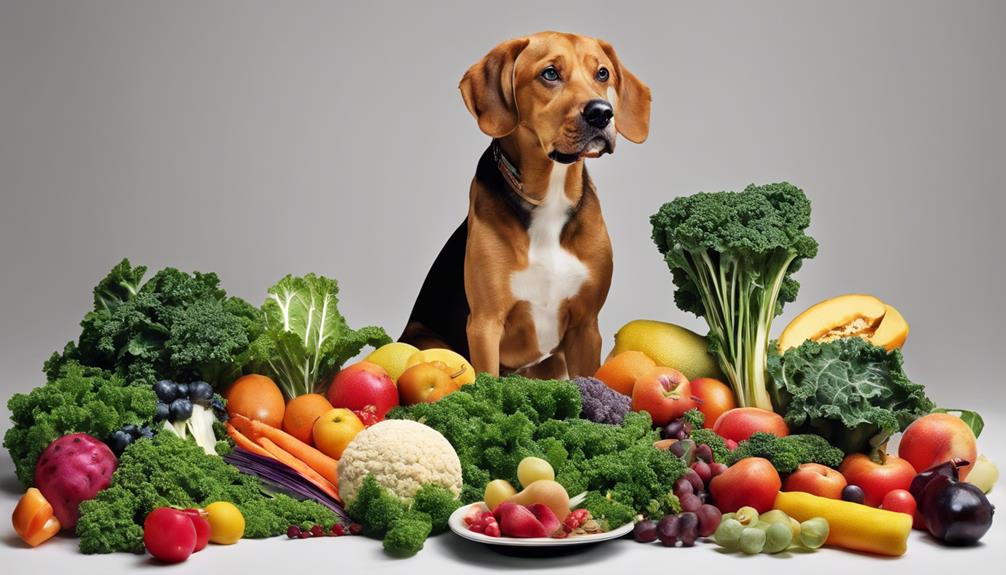
When it comes to feeding kale to dogs, it's important to control the portion size to prevent potential health issues. Monitoring your dog's dietary needs and ensuring moderation in feeding can help maintain their well-being.
Consulting with a veterinarian for guidance on the appropriate amount of kale for your furry friend is essential to keep them healthy and happy.
Portion Control Importance
Why is maintaining portion control important when feeding kale to dogs? Portion control plays an essential role in ensuring that dogs benefit from kale without risking their health. Here are some key points to ponder:
- Prevents Health Risks: Overfeeding kale can lead to issues like kidney or bladder stones in dogs.
- Ensures Balance: Offering kale in small portions as an occasional treat helps maintain a balanced diet.
- Guidelines for Size: Following recommended portion sizes based on the dog's size is vital for their well-being.
- Safe Feeding Routine: Monitoring the dog's reaction to kale and adjusting portions accordingly ensures a safe and enjoyable feeding experience.
Monitoring Dietary Needs
To guarantee peak health and well-being for your dog, it's important to monitor their dietary needs, especially when it comes to incorporating kale into their diet in moderation. Feeding kale in controlled amounts helps prevent potential health risks due to its high calcium oxalate content.
By monitoring your dog's dietary intake, you can avoid digestive issues and complications that may arise from overconsumption. Remember, small portions of kale can be beneficial, but excessive feeding can lead to nutrient imbalances and other health concerns.
Consulting with a veterinarian is important to determine the right amount of kale based on your dog's size, breed, and individual health conditions. Watch how your dog responds to kale and adjust the quantity accordingly to ensure their well-being and digestive health.
Consulting a Veterinarian

For personalized guidance on whether feeding kale is suitable for your dog based on their individual health conditions, consulting a veterinarian is essential. Veterinarians can provide tailored advice to guarantee your furry friend's well-being. Here are some reasons why consulting a vet is vital:
- Preventing Potential Health Risks: Vets can help identify any health concerns or risks associated with kale that may impact your dog.
- Guaranteeing Safe Feeding Practices: Consulting a vet before introducing kale can help establish safe feeding practices for your dog.
- Recommendation of Alternative Treats: If kale isn't suitable for your dog, veterinarians can suggest alternative healthy treats to incorporate into their diet.
- Tailored Advice: Discussing concerns about kale with a vet allows for personalized and tailored advice on whether it's appropriate for your dog's specific dietary needs.
Kale Vs. Other Vegetables
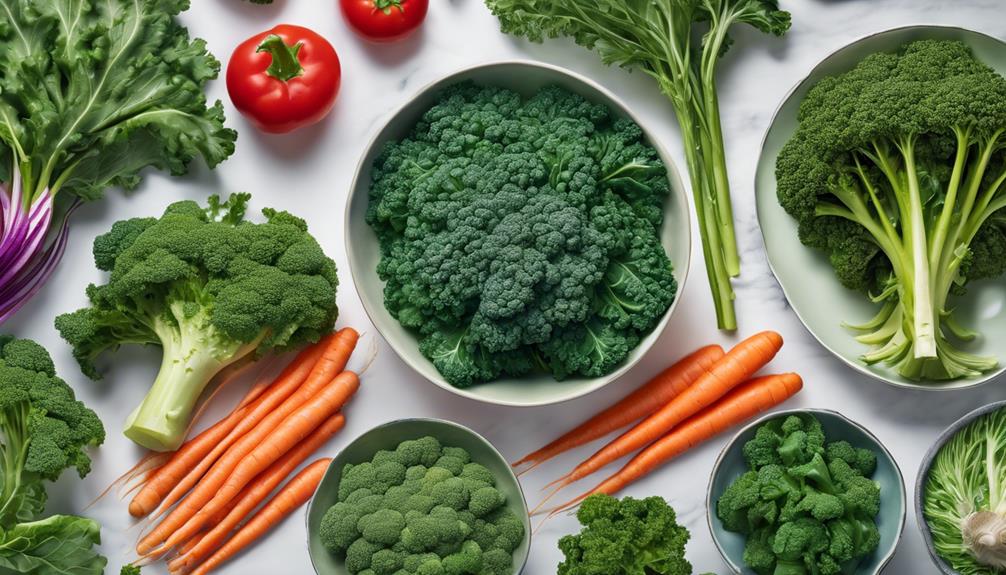
Comparing kale to other vegetables reveals its exceptional nutrient profile and benefits for dogs. When considering options for your furry friend, it's crucial to acknowledge that kale belongs to the cruciferous vegetable family, packed with essential vitamins and minerals. While small amounts of kale can be a great addition to your dog's diet, those prone to bladder stones should avoid it due to its calcium content. To showcase the advantages of kale over other veggies, let's compare it in a table format:
| Vegetable | Nutrient Content |
|---|---|
| Kale | High in vitamins A, K, and C. Low in calories. Rich in antioxidants. Good for digestion. |
| Lettuce | Lower in essential nutrients. Not as rich in antioxidants. Lighter on the stomach. |
| Cabbage | Moderate in vitamins and minerals. Can be harder to digest. Good for occasional intake. |
| Broccoli | Similar health benefits to kale. High in fiber. Offers good overall nutrition. |
Considering the diversity of nutrients kale offers, incorporating it into your dog's diet in moderation can contribute to their well-being and daily intake of essential vitamins and minerals.
Health Benefits of Kale
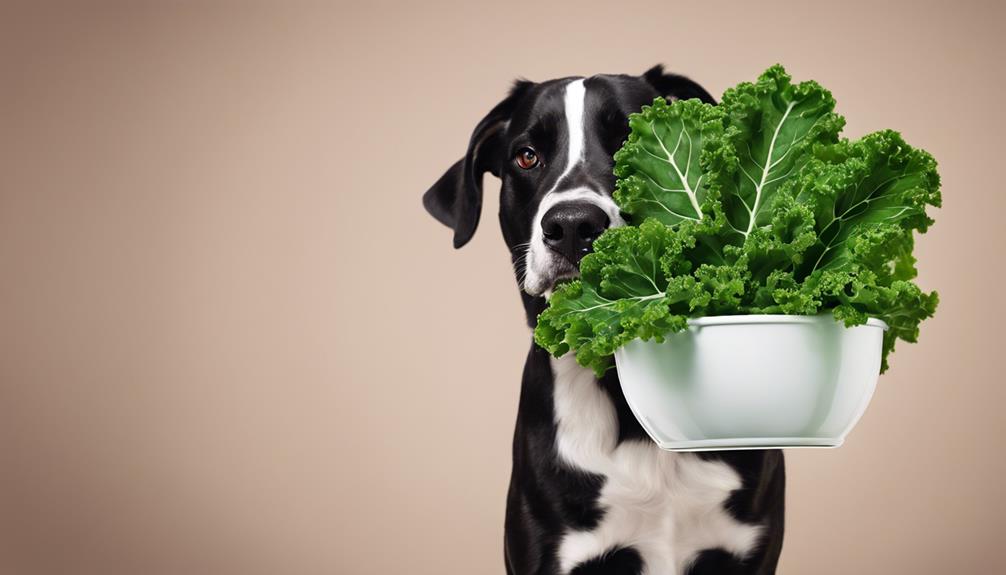
Kale's abundance of antioxidants and essential nutrients make it a valuable addition to a dog's diet for promoting overall health and well-being. Here are some neat benefits of kale for your furry friend:
- Antioxidants Galore: Kale is a safe source of antioxidants that help keep your dog's cells healthy and protected.
- Kidney and Bladder Support: The nutrients in kale can contribute to maintaining neat kidney and bladder function in dogs.
- Eye Health Booster: Kale's beta-carotene content is great for supporting your dog's vision and protecting their retina.
- Overall Wellness: With a mix of vitamins and minerals like copper, potassium, magnesium, and iron, kale contributes to your dog's safe and balanced well-being.
Incorporating kale into your dog's diet in moderation can provide a range of health benefits, keeping them happy and healthy.
Potential Health Risks
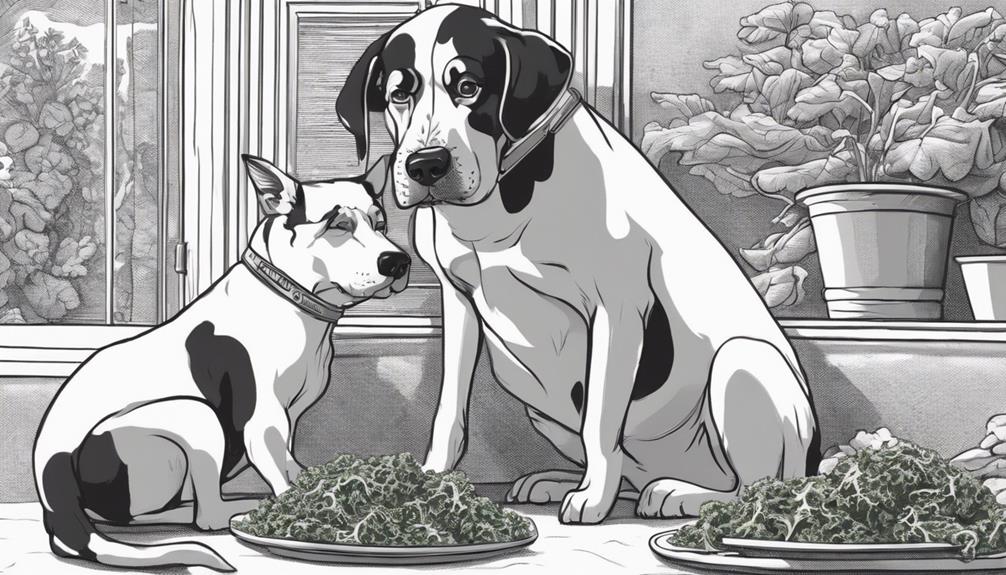
High levels of calcium oxalate in kale present potential health risks for dogs, including the formation of kidney and bladder stones. This compound can be harmful if kale is consumed in large amounts, increasing the risk of these stones.
Additionally, isothiocyanates in kale can cause gastric irritation, leading to digestive issues in dogs. The excessive fiber in kale might result in gastrointestinal problems, causing discomfort.
Moreover, feeding dogs too much kale could negatively impact their thyroid function, especially for those with existing thyroid issues. It's essential to monitor the total amount ingested, as excessive intake of kale can have negative consequences on your dog's health.
Remember that while kale can be a neat addition to your dog's diet, moderation is key to prevent any health issues. Always consult with your veterinarian to ensure the foods you're feeding your dog are safe and not toxic to dogs.
Final Considerations
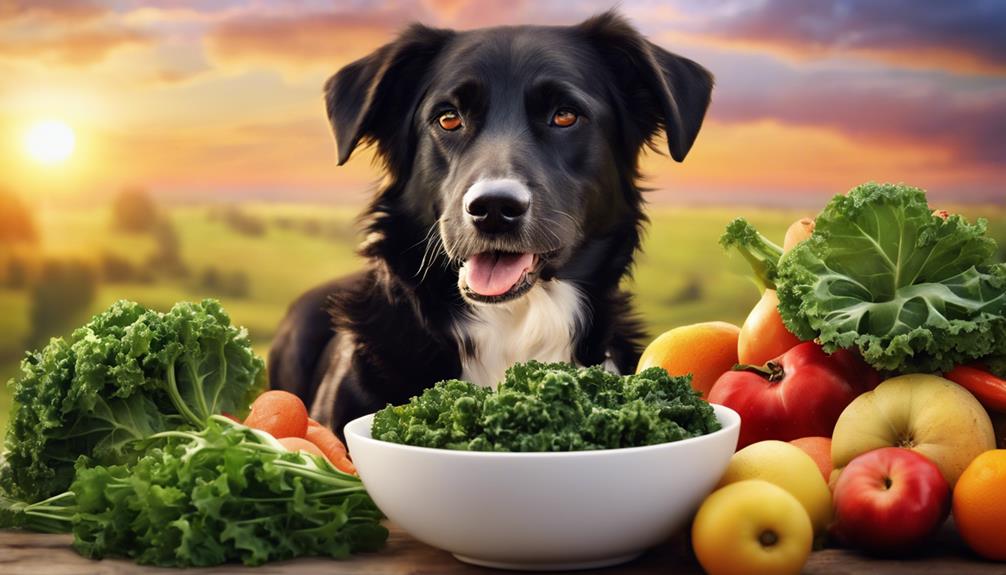
Considering the potential health risks associated with feeding kale to dogs, it's important to take final considerations into account before incorporating this vegetable into your pet's diet.
When deciding whether to feed kale to your dog, remember:
- Amount Ingested is Less: Moderation is key. Feeding kale in small amounts reduces the risk of digestive issues.
- Cause Mild: While kale is generally safe, it can cause mild gastrointestinal upset in some dogs.
- Thyroid Function: Dogs with thyroid issues should avoid kale due to its goitrogenic properties that may interfere with thyroid function.
- Talk to Your Vet: Consulting your vet before introducing kale is essential, especially if your dog has underlying health concerns.
Frequently Asked Questions
How Much Kale Can a Dog Eat?
We can offer dogs kale in measured amounts based on their size. Starting with a small quantity, like 1/2 teaspoon per week for tiny dogs, and adjusting as needed. It's important to watch for any digestive reactions, such as constipation or diarrhea, when introducing kale into their diet.
Following the recommended serving sizes tailored to your dog's weight can prevent potential gastrointestinal issues. Remember, moderation is key when feeding kale to our furry companions.
Is Spinach or Kale Good for Dogs?
When contemplating spinach or kale for dogs, it's crucial to recognize that spinach is a safer choice because of its lower oxalate levels. Spinach provides comparable nutrients such as vitamins A, C, and K, making it a nutritious option.
Dogs can consume cooked spinach in moderation, supporting digestion without the potential hazards linked to kale. Before incorporating spinach into your dog's diet, it's advisable to consult your vet, especially if your dog has specific health requirements or dietary limitations.
What Are the Healthiest Vegetables for Dogs?
When it comes to the healthiest vegetables for dogs, we recommend incorporating:
- Carrots
- Green beans
- Sweet potatoes
- Zucchini
- Broccoli
These veggies are packed with essential nutrients like vitamins and fiber, promoting overall health and digestion. While each dog is different, these vegetables are generally well-tolerated and offer a range of benefits.
Remember to introduce new foods gradually and in moderation to avoid any digestive issues.
Can Dogs Have Pureed Kale?
When it comes to pureed kale for dogs, it can be a convenient way to incorporate this nutritious veggie into their diet. The pureed form can be easier for dogs with dental issues or smaller breeds to consume. Plus, it retains most of its nutritional benefits, like vitamins, minerals, and antioxidants.
Dogs may find the texture of pureed kale more palatable than raw or cooked kale. Just make sure it's plain and free from harmful additives like garlic or onions.
Conclusion
To sum up, feeding kale to dogs can be beneficial in moderation, but it's important to be aware of potential risks such as calcium oxalate and digestive issues.
Remember, too much of a good thing can be harmful, so always consult with your veterinarian before making any significant changes to your dog's diet.
As the saying goes, 'everything in moderation' – including kale for your furry friend.
